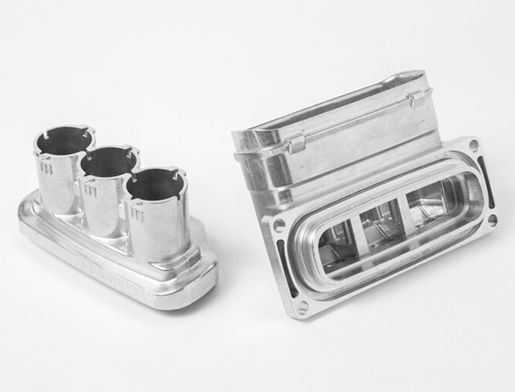We attach great importance to customers' needs for product quality and rapid production.
We always insist that meeting customers' needs is to realize our value!
+86 133 9281 9446
Die casting is a highly efficient process in the manufacture of metal parts today for the rapid prototyping of fine, high volume metal parts. And with high precision molds, every batch of parts, whether it's a hundred or thousands, can be made to a high standard of consistency and efficiency.
The die casting process is one of the fastest ways to take your product from design to finished product. With state of the art equipment and high-standard machining procedures, Kaierwo is able to support our customers with the technical aspects of die casting precision parts quickly and cost effectively, ensuring complete customer satisfaction.
Perhaps you have a need for small batch metal part casting, but can't find the right manufacturer —large foundry companies tend to favor mass production orders. Kaierwo is a good choice for you. We offer die casting services for aluminum, zinc, and magnesium, as well as mold casting for other metal materials. Best of all, we can service low volume manufacturing!
Get custom die cast metal parts, request a quote, and get started today!
Die casting is a manufacturing process in which molten metal is pressed into a mold cavity under high pressure to produce metal parts with excellent dimensional accuracy and surface finish. The process is often used to produce metal parts with complex shapes, such as automotive parts, industrial machinery parts, electronic equipment housings, etc.
Kaierwo has high precision machines and die-casting dies, standardized production processes and quality control inspection methods. Give us your design and we will give you a solution and quotation within 24 hours!
Power Tools
Outdoor Equipment Housing
Motor Cover
Medical Devices
Meat Grinder Accessories
Lighting Parts

High cost-effectiveness in mass production

High productivity and speed

Excellent fineness and surface finish

Capable of producing thin-walled products with complex shapes

Suited medium or largemetal parts


You may be unfamiliar with Kaierwo die casting services right now, but we've given good reason to believe that you'll agree with us once you get to know us!
We have our own mold manufacturing workshop and a professional die-casting mold team, which can efficiently design and manufacture good die-casting molds.
We have established excellent relationships with our partners in die casting and investment casting.
We have a large number of precision CNC machine tools for post-processing With our project management experience, we can guarantee a smooth flow of information and on-time delivery.
Kaierwo die casting service can work with these materials:Al-Si alloy, Al-Si copper alloy, Aluminum-magnesium alloy
1. Mechanical properties
The tensile strength, yield strength, hardness and ductility of the material are in accordance with the requirements for the use of the product and the processing requirements, and whether it is necessary to carry out molding operations in the subsequent processing.
2. Physical properties
Density: Whether the density of the material is suitable for the weight requirements of the product, especially for weight-sensitive industries such as aerospace and automotive.
Thermal and electrical conductivity: Whether the thermal and electrical conductivity of the material meets the needs of a particular application, such as electronic component housings that require good heat dissipation.
3. Corrosion resistance
Environmental conditions: Whether the product is exposed to corrosive environments in the application, which needs to be taken into account when selecting materials.
4. Machinability
Casting performance: How well the material flows and fills, and whether it can effectively fill the complex shapes of the mold.
Subsequent processing: the material in the process of cutting and surface treatment performance, whether it is easy to drill, tapping, polishing and other operations.
5. Cost
Material Cost: Whether the cost of the material is within budget, the overall cost of using the material for die casting production, including the cost of mold manufacturing, processing and handling.
Aluminum alloy and Copper alloy
Aluminum: Aluminum has the advantages of light weight, high strength, good corrosion resistance and thermal conductivity, suitable for automotive parts, electronic equipment shells, aerospace parts.
Copper: with high strength, high hardness, excellent electrical and thermal conductivity, often used for electrical components, pipe fittings, industrial machinery parts.
Zinc alloy and small aluminum and magnesium alloy
Magnesium: Magnesium is an extremely lightweight metal suitable for metal parts with stringent weight requirements, such as electronics housings, automotive parts, and handheld devices.
Zinc: Good flowability and filling ability, suitable for low melting point, suitable for complex shapes and thin-walled parts, such as small precision parts, decorative parts, electronic and electrical components.
Zinc: low melting point, excellent fluidity, suitable for complex shapes and detailed thin-walled structures. Its tensile and impact strength is high, suitable for precision die casting.
FAQ
Is there a minimum order quantity?
We generally accept metal casting orders of no fewer than 100 units.
Can you help me to design my product or improve my design?
Yes, we have a professional design team to help our customer to create their product or improve their design. We need sufficient communication before design to understand your intention.
What are Kaierwo's quality standards for its pressure die casting services?
Our rigorous quality standards set our team apart from other pressure die casting services. As with all of our volume manufacturing services, the secret to getting great parts is consistency.
How can you keep your promise about quality?
We have an independent quality department to check every step by IQC, IPQC, OQC.If there are any defective items we willl take corrective action to ensure the elimination of the root cause of defects. When you get the goods and find there is a defect after check. We promise to accept your asked return at our cost or provide replacement free.
How to get a quote?
Please send your 3d drawing(STP, IGS, STL, OBJ, X-T...) to us, and tell us the material, surface treatment and quantity, then we will quote within 2 hours.
We attach great importance to customers' needs for product quality and rapid production.
We always insist that meeting customers' needs is to realize our value!



















